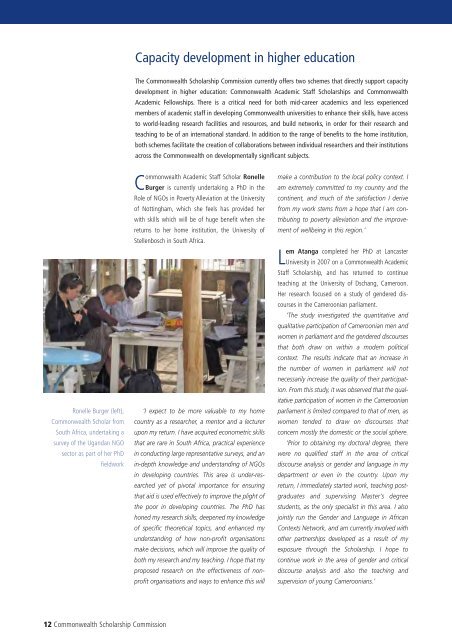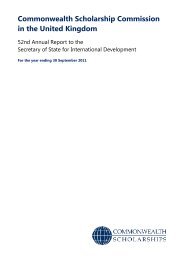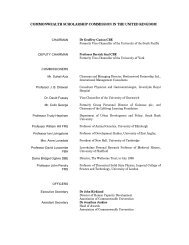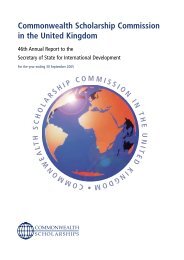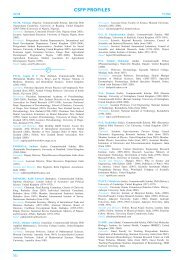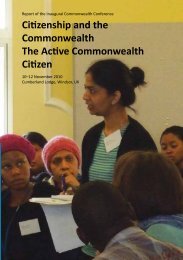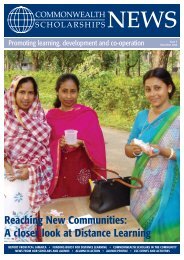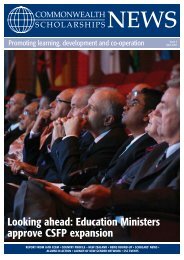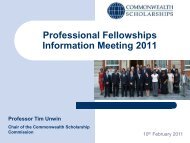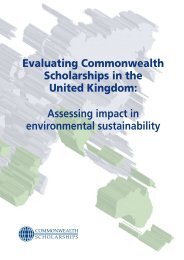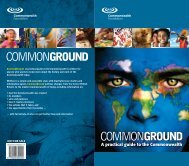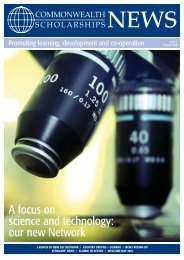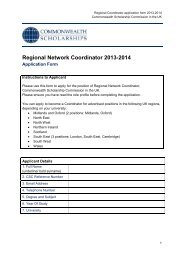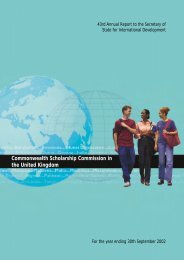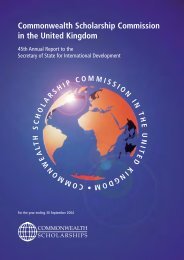49th Annual Report (2007-2008) - Commonwealth Scholarship ...
49th Annual Report (2007-2008) - Commonwealth Scholarship ...
49th Annual Report (2007-2008) - Commonwealth Scholarship ...
Create successful ePaper yourself
Turn your PDF publications into a flip-book with our unique Google optimized e-Paper software.
Capacity development in higher education<br />
The <strong>Commonwealth</strong> <strong>Scholarship</strong> Commission currently offers two schemes that directly support capacity<br />
development in higher education: <strong>Commonwealth</strong> Academic Staff <strong>Scholarship</strong>s and <strong>Commonwealth</strong><br />
Academic Fellowships. There is a critical need for both mid-career academics and less experienced<br />
members of academic staff in developing <strong>Commonwealth</strong> universities to enhance their skills, have access<br />
to world-leading research facilities and resources, and build networks, in order for their research and<br />
teaching to be of an international standard. In addition to the range of benefits to the home institution,<br />
both schemes facilitate the creation of collaborations between individual researchers and their institutions<br />
across the <strong>Commonwealth</strong> on developmentally significant subjects.<br />
Ronelle Burger (left),<br />
<strong>Commonwealth</strong> Scholar from<br />
South Africa, undertaking a<br />
survey of the Ugandan NGO<br />
sector as part of her PhD<br />
fieldwork<br />
<strong>Commonwealth</strong> Academic Staff Scholar Ronelle<br />
Burger is currently undertaking a PhD in the<br />
Role of NGOs in Poverty Alleviation at the University<br />
of Nottingham, which she feels has provided her<br />
with skills which will be of huge benefit when she<br />
returns to her home institution, the University of<br />
Stellenbosch in South Africa.<br />
‘I expect to be more valuable to my home<br />
country as a researcher, a mentor and a lecturer<br />
upon my return. I have acquired econometric skills<br />
that are rare in South Africa, practical experience<br />
in conducting large representative surveys, and an<br />
in-depth knowledge and understanding of NGOs<br />
in developing countries. This area is under-res -<br />
earched yet of pivotal importance for ensuring<br />
that aid is used effectively to improve the plight of<br />
the poor in developing countries. The PhD has<br />
honed my research skills, deepened my knowledge<br />
of specific theoretical topics, and enhanced my<br />
understanding of how non-profit organisations<br />
make decisions, which will improve the quality of<br />
both my research and my teaching. I hope that my<br />
proposed research on the effectiveness of nonprofit<br />
organisations and ways to enhance this will<br />
make a contribution to the local policy context. I<br />
am extremely committed to my country and the<br />
continent, and much of the satisfaction I derive<br />
from my work stems from a hope that I am con -<br />
tributing to poverty alleviation and the improve -<br />
ment of wellbeing in this region.’<br />
Lem Atanga completed her PhD at Lancaster<br />
University in <strong>2007</strong> on a <strong>Commonwealth</strong> Academic<br />
Staff <strong>Scholarship</strong>, and has returned to continue<br />
teaching at the University of Dschang, Cameroon.<br />
Her research focused on a study of gendered dis -<br />
courses in the Cameroonian parliament.<br />
‘The study investigated the quantitative and<br />
qualitative participation of Cameroonian men and<br />
women in parliament and the gendered discourses<br />
that both draw on within a modern political<br />
context. The results indicate that an increase in<br />
the number of women in parliament will not<br />
necessarily increase the quality of their part ic ip at -<br />
ion. From this study, it was observed that the qual -<br />
itative participation of women in the Cameroonian<br />
parliament is limited compared to that of men, as<br />
women tended to draw on discourses that<br />
concern mostly the domestic or the social sphere.<br />
‘Prior to obtaining my doctoral degree, there<br />
were no qualified staff in the area of critical<br />
discourse analysis or gender and language in my<br />
department or even in the country. Upon my<br />
return, I immediately started work, teaching post -<br />
graduates and supervising Master’s degree<br />
students, as the only specialist in this area. I also<br />
jointly run the Gender and Language in African<br />
Contexts Network, and am currently involved with<br />
other partnerships dev eloped as a result of my<br />
exposure through the <strong>Scholarship</strong>. I hope to<br />
continue work in the area of gender and critical<br />
discourse analysis and also the teaching and<br />
supervision of young Cameroonians.’<br />
12 <strong>Commonwealth</strong> <strong>Scholarship</strong> Commission


